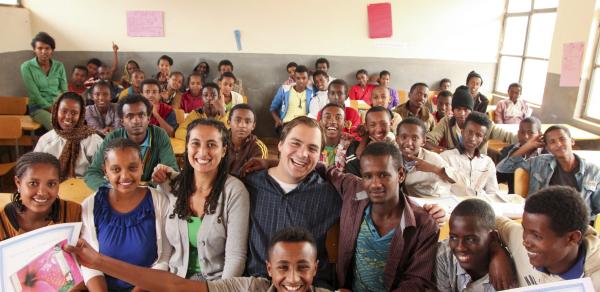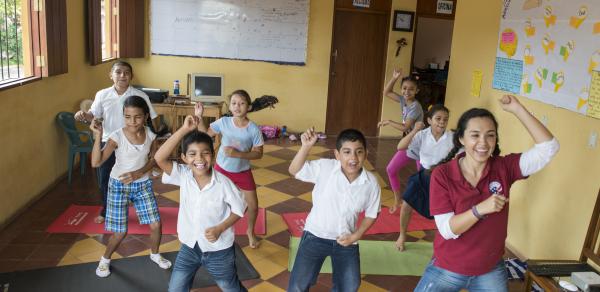Education
Teach lessons that last a lifetime. Education is the Peace Corp’s largest program area. Volunteers play an important role in creating links among schools, parents, and communities by working in elementary, secondary, and postsecondary schools as math, science, conversational English, and resource teachers or as early grade reading and literacy teacher trainers. Volunteers also develop libraries and technology resource centers.
If you choose the Education sector as your Peace Corps Prep focus you will need to take three courses from one of the following areas (the courses must all be in the same area; see list below):
- Elementary, Secondary, or Special Education
- English or Linguistics
- Math
- Computer Science
- Engineering
- Any Physical or Biological Science
You will also need to complete 50 hours of related experience such as teaching or significant outreach and mentoring in a classroom, a community outreach organization, or in a formal tutoring capacity.
Examples of field experiences include student observation, student teaching, tutoring at the K-12 levels, or teaching in a youth outreach program. You may be able to complete this through your practicum coursework (Education, Social Work, etc.) or you may choose to arrange this on your own. Other volunteer opportunities for teaching exist through organizations such as the Department of Youth and Community Development, South Bronx United Boys Prep, Goddard Riverside Community Center, City Tutors, and Imani House, Inc. Both your PC Prep advisor and the Center for Professional Development can assist you in finding an appropriate opportunity.
Courses particularly relevant to service-oriented fieldwork are listed below. Students are encouraged to choose at least one course from the list below for inclusion in the three-course requirement.
- AAD 321 Race, Law, and Public Policy in the Contemporary United States
- AMS 214 America in the World
- AMS 306 Latinas/os in the United States
- ANT 100 Understanding Our Worlds
- ANT 225 Multicultural Literacy
- ANT 305 Power and Society in Latin America
- ANT 308 Anthropology of Human Rights
- ANT 331 Women and Work
- ANT 332 Social Movements and Social Justice
- ANT 350 Foraging Societies
- BIO 220 Healthcare Law and Ethics
- BIO 321 Conservation Biology
- BIO 324 Developmental Biology
- CHN 308 Gender and Sexuality in China and Japanese Literature
- CHN 313 Advanced Communication Skills in Mandarin Chinese
- DRA 350 Theater for Social Action
- EDC 310 Reading and Writing in the Primary Grades
- EDC 440, 441 Student Teaching and Seminar in Early Childhood Education I, II
- EDE200 Social Foundations of Education
- EDE 400 Student Teaching in Elementary Education
- EDS 400 Student Teaching in Secondary Education
- EDC 316 Social Contexts of Early Childhood Education
- EDS 201 Social Foundations of Secondary Education
- ENH 209 Literature and Global Cultures
- ENH 223 Introduction to African Diaspora Literature
- ENH 224 U.S. Literature: Multicultural Perspectives
- ENL290 Introduction to Literary Studies
- ENL310 World Literature in Contexts
- GEG 102 People and Their Environment
- GEG 232 Social Geography
- GEG 250 Conservation and Humanity
- GEG 252 Economic Geography
- GEG 260 Urban Geography
- GEG 264 Political Geography
- GEG 266 Environmental Ethics
- GEG 275 Place, Race, and Racism
- GEO 102 Earth Systems History
- HON 205 Non-U.S. Experience: Humanities
- HON 206 The Non-Western Experience: Social Sciences
- HST 267 Contemporary African Issues
- HST 284 The Soviet Union and Contemporary Russia
- HST 305 Women in Latin America
- HST 330 Nationalist Movements and the Process of Independence in Africa
- HST 331 Black Intellectual Thought in the African Diaspora
- HST 352 Resistance and Revolt in Latin America
- INT 203 Gender in the Contemporary World
- INT 305 Power and Society in Latin America
- INT 332 Social Movements and Social Justice
- MTH 306 History of Mathematical Thought
- NRS 305 Women's Health Issues Across the Lifecycle
- NRS 310 Interpersonal Dynamics for Professional Nurses
- NRS 315 Cultural Immersion and Global Health
- PHL 238 Ethical Issues in Business and Society
- PHL 266 Environmental Ethics
- POL 343 Democracy and Democratization
- POL 349 Comparative Human Rights
- PSY 213 Cross-Cultural Psychology
- PSY 235 Gender and Sexuality
- PSY 350 Prejudice and Social Identity
- SOC 202 Gender, Race, Ethnicity, and Class
- SOC 260 Class, Status, and Power
- SOC 328 Gender and Violence
- SOC 340 Ethnicity and Immigration
- SOC 350 Psychosocial Aspects of Disability
- WGS 201 Introduction to Women's, Gender, and Sexuality Studies
- WGS 202 Gender, Race, Ethnicity and Class
- WGS 203 Gender in the Contemporary World
- WGS 204 LGBTQ Narratives
- WGS 368 Queer Studies
- WGS 369 Gender and the Negotiation of Difference
- WGS 375 Sex and Society

